THE RATIONALE FOR A PAN-AFRICAN CIVIL SOCIETY MOVEMENT
Africans Rising for Justice, Peace and Sustainable Development
AFRICAN CIVIL SOCIETY REORGANISING
Hundreds of years of oppression under colonial rule and decades of suffering neoliberal doctrine, cold war rivalries and a deficiency of altruistic and visionary leaders has precipitated an economic and social crisis in Africa whose catastrophic consequences are still unfolding today. It is with this historical context in mind that a new pan-African civil society initiative has emerged – a broad based African civil society platform.
“We, the citizens and descendants of Africa, as part of the Africans Rising Movement, are outraged by the centuries of oppression; we condemn the plunder of our natural and mineral resources and the suppression of our fundamental human rights.
We are determined to foster an Africa-wide solidarity and unity of purpose of the Peoples of Africa to build the Future we want – a right to peace, social inclusion and shared prosperity.”
This is the preamble to the Kilimanjaro Declaration that was adopted at the #AfricansRising Conference held on 23-24 August 2016 at the MS Centre for Development Cooperation in Eastern and Southern Africa, Arusha, Tanzania. The conference was attended by two hundred and seventy two representatives from civil society, trade unions, women, young people, men, people living with disabilities, parliamentarians, media organisations and faith-based groups from 40 countries across Africa and the African diaspora, who are committed to building a pan-African movement that recognises these rights and freedoms of our People.
The Kilimanjaro Declaration from Africans Rising on Vimeo.
According to the Vision statement of AfricansRising, over the past few years various global institutions and media have repeatedly referred to the phenomenon of “Africa Rising” to describe the growth story of Africa. It is often reduced to increases in gross domestic product (GDP) of some countries. However, the celebration of this economic growth story takes place while the majority of people on the continent continue to suffer marginalisation, deep poverty and inequality. This is not the story of inclusive development that respects the culture, heritage and human rights of all African people. It is in many instances characterised by the devastation of our natural environment, the displacement of multiple communities, major land grabs and massive illicit financial flows that deprive the public purse of resources to ensure the delivery of services by governments. Indeed, the challenges we face are not that different from those of hundreds of millions of people all over the world. The current economic system is deepening inequality and the level of state capture by the 1% super wealthy in “developed” and “developing” countries.
It is against this backdrop that discussions took place about a new broad-based African civil society initiative that would seek justice, peace and inclusive sustainable development driven by people from below and that is not confined by borders. These discussions, starting in October 2015, involved a series of consultations with civil society activists, regional and local networks, NGOs, international non-governmental organisations (INGOs), trade unions and faith-based groups across the continent.
Some consensus points emerged during these discussions, which included three main trends: –
- Africa was still too weak to fight climate injustice, political exclusion and economic globalisation.
- Too many autocratic African Governments were continuing to shrink civic space and seeking to control civil society independence.
- INGOs were continuing to dominate local and national NGOs, whilst both were increasingly disconnected from social movements from the poorest and most marginalised.
However, this list was not regarded as fait accompli for the new civil society platform. The intention was to reflect some consensus on possible pathways towards establishing the network; what would make the processes and outcomes of this one different from previous attempts at creating civil society unity; and how consensus could be achieved.
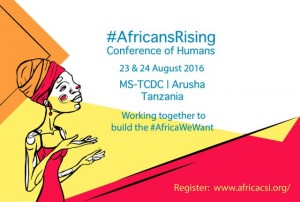 Therefore, the #AfricansRising conference followed on from the initial gathering of African civil society representatives in October 2015 that confirmed the need for a ‘dynamic and robust space where African civil society leaders engaged in various civil struggles could convene to collaborate and share knowledge.’ The purpose of the conference was to validate the need for such a space for African civil society and to consolidate the visions and views towards building a continent wide social justice platform for civil society advancement, solidarity and protection.
Therefore, the #AfricansRising conference followed on from the initial gathering of African civil society representatives in October 2015 that confirmed the need for a ‘dynamic and robust space where African civil society leaders engaged in various civil struggles could convene to collaborate and share knowledge.’ The purpose of the conference was to validate the need for such a space for African civil society and to consolidate the visions and views towards building a continent wide social justice platform for civil society advancement, solidarity and protection.
In addition, it was expected that by the end of the two-day conference, participants would have identified the most effective mechanisms to establish this platform by reaching agreement on the main organising rationale, programming areas, membership and governance model and resource-mobilisation strategy.
The conference programme themed, ‘Validating the Vision and Programming’, was focused on five thematic areas for the initiative:
- Expanding Civic Space
- Gender Inequality
- Inequalities
- Corruption/Impunity, and
- Climate Justice
The conference was structured around participatory, experiential and deliberative thought circles and plenaries that helped to deepen analysis and programming vision in the five themes, and produced concrete implementable mechanisms and potential benchmarks against which success could be measured across the year.
DIASPORA CIVIL SOCIETY PARTICIPATION
The Africa Civil Society Initiative (ACSI) has been designed to be inclusive of all citizens and civil society organisations, and with a focus of ensuring that civil society organisations, especially NGOs, act as catalysts and support the leadership of social and grassroots movements. However, The Vision statement of AfricansRising acknowledges that too often, external power relations influence civil society organisations in Africa. While it is not generally true that the agendas pushed by international NGOs are necessarily those of their national governments, it is still worth noting that sometimes, local civil society practices self-censorship or contort to fit into the funding guidelines of international NGOs and foundations. That then distracts them as, instead of focusing on their struggles for social justice, they redirect their energies towards fragmented projects and the kind of detailed reporting and other prescriptions merely meant to meet the narrow needs of donors.
Unfortunately, this practice also applies to many Diaspora civil society organisations. It was therefore very satisfying to note that Diaspora civil society organisations were invited to attend the #AfricansRising conference from across the continent and the rest of the world. It was envisaged that membership of the initiative would span a range of categories, including, duly constituted conventional and registered organisations, individual membership, African Diaspora membership, and an option of associate membership for global partners. Hence, this time, as African civil society was gearing up to ‘Rise’ in Arusha, Tanzania, it was planning to take its Diaspora civil society with it.
UNITED KINGDOM DIASPORA CIVIL SOCIETY REPRESENTATION
Part of the United Kingdom Diaspora delegation included four African Foundation for Development (AFFORD) and Comic Relief representatives who were co-sponsored by ACSI and the Common Ground Initiative (CGI). The participants were:
1. Chibwe Henry: Founder and CEO, Diaspora for African Development (DfAD). DfAD, which is based in London, is an African Diaspora led development organisation that aims to contribute to Africa’s sustainable social and economic development through harnessing the potential of the African Diaspora for development.
2. Eliza Anyangwe: UK based Journalist.
3. reGina Jane Jere: UK based Editor, New African Woman Magazine
4. Na Ncube: Founder and Director, The Global Native. The Global Native is a UK registered Diaspora led charity which seeks to unlock funds for social investment (particularly from the Diaspora) for rural farming and development in Zimbabwe. The Global Native also seeks to educate and influence policy for sustainable development.
CGI is a DFID co-funded Initiative for the UK-based African diaspora working in international development and works to two key themes: Diaspora Finance & Investment and Women and Girls’ Rights. AFFORD is a prominent UK-based African diaspora-led organization. They are one of the leading voices on diaspora and development, focused especially on job creation in Africa. As delivery partners for the CGI Diaspora Finance and Investment programme; a programme set up to harness UK African communities’ ability to drive positive change in Africa, AFFORD were in the best position to advocate for greater and meaningful Diaspora-Africa civil society engagement at the Conference, and to champion poverty eradication, amongst other issues.
The four Diaspora representatives made significant contributions to the conference discussions. Besides attending sessions across the five thematic areas, they played a significant role in drawing up the Kilimanjaro Declaration and co-moderating and supporting the running of a number of discussions that included a session that covered raising funds and other resources from the Diaspora.
Furthermore, Chibwe Henry facilitated a successful ‘Open Space Conversation’ session themed, ‘Engaging Diaspora Civil Society Effectively’. The discussion covered the benefits of Engaging Diaspora Civil Society, the potential barriers and the mechanisms for engagement, and concluded with recommendations.
Some of the benefits for continent-based Civil Society organisations were identified as:
- Expanded funding sources;
- Opportunities for building capacity through ‘Brain Gain’;
- Diaspora advocating on their behalf, both in their countries of heritage and destination;
- Remittances;
- Diaspora representing their nations.
The main barriers that were identified were:
- Miscommunication on both sides, on an individual and organisational level;
- Lack of clear understanding of Diaspora context by civil society on the continent;
- Diaspora being treated and engaged as a homogeneous group.
The recommendations from the session participants, which included both continent-based and Diaspora Civil Society individuals were as follows:
- There is an expectation for Diaspora to ‘do for Africa’ but not for what ‘Africa can do’ for the Diaspora.
- ACSI should develop an accessible database of Diaspora Civil Society organisations.
- Both continent-based and Diaspora Civil Society should take advantage of platforms such as ACSI and the African Union’s The Diaspora Division in order to facilitate better conversations that help to understand each other better.
- Focused/directed themes from ACSI, for engagement on social media, e.g., technology, enterprise, partnership working, etc, could also assist with improving communications.
- Continent-based and Diaspora Civil Society should work together to advocate, campaign and promote the movement, leading up to the proposed ACSI platform launch on 25th May 2017, on Africa Day.
- Continent-based Civil Society should advocate on behalf of Diaspora.
- A proposal was made to set up a targeted facebook group and hold regular Diaspora engagement focused Twitter chats, in order to encourage more Diaspora engagement.
It is widely acknowledged that many of the challenges that Africa faces today, such as land grabs, the effect of climate change, the shrinking of the democratic space and corruption, will certainly not be addressed by service delivery improvements alone. Therefore, the need to include and work together with Diaspora to develop plans that could address the many structural and systemic challenges across the continent, at both local and continental level, was reiterated throughout the conference.
ACSI’S PROGRAMME OF ACTION AND RESOURCING STRATEGY
Furthermore, establishing strong Diaspora ties within the platform could significantly contribute to Africans Rising’s effective implementation of the ‘Programme of Action’. The programme includes, Advocacy, Knowledge Curation, Leadership Development, Alliance Support and Strategic Convening. This is affirmed in the Vision statement, which states that Africans Rising will succeed not because of grand continental-wide campaigns but because of a multitude of smaller, locally relevant, people-driven initiatives. These are envisioned to include Diaspora.
The Africans Rising Movement also acknowledged, through their Resourcing Strategy, the reality that African civil society organisations still had a high level of dependence for resources from outside the continent. Such resourcing mainly comes from solidarity funding, international NGOs, foundations, trusts, faith-based organisations and bilateral and multilateral government support. However, the fact that civil society organisations were heavily dependent on foreign support meant that African governments were often able to dismiss positive civil society initiatives, however legitimate and relevant, as foreign-inspired interference.
A further reality identified by Africans Rising was that there was an insufficient culture of giving on the continent. This notion stems from a widely held misunderstanding of Africa’s philanthropic cultural context based on an emphasis on formal philanthropic institutions and involving money. Nevertheless, even though a few formal charitable institutions exist and many ‘African philanthropic activities’ are neither documented nor promoted across the continent or the rest of the world, actual philanthropy in Africa exists both formally and informally, and through individual and communal channels that do not often involve money. This is demonstrated by the Southern African concept of Ubuntu, meaning, “I am because you are”, which reinforces Africa’s culture of giving and mutual support. The billions of pounds remitted to the continent by Africans in the diaspora every year further reaffirms this.
Therefore, to address the challenge of increasing the amount of philanthropic giving while raising the levels of resources available within the continent, it was proposed at the conference that Africans Rising adopt a strategy for the initiative that will to be supported primarily by resources raised by and within the African continent and the African Diaspora within five years of the launch. This is vital if the movement that results is not to be subject to accusations of being foreign-owned, foreign-inspired and/or foreign-influenced. Hence, the movement will explore a diversity of funding sources, which will include membership fees from people who join the movement, resources from African foundations and resources from the African Diaspora. For example, if ACSI were able to interest one million Africans on the continent and in the Diaspora to contribute $1 a month to the movement, its financial independence would very quickly be secured.
Diaspora organisations such as AFFORD could play a leading role in contributing to resourcing the work of Africans Rising too. As the delivery partner for CGI Diaspora Finance and Investment programme, AFFORD is in a position to facilitate new and consolidate existing partnerships between continent-based and Diaspora civil society; their programme funding aims to assist with maximising the impact of investment by UK based African communities.
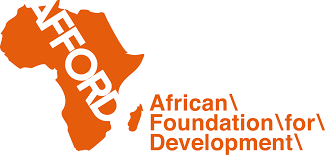 “Investment in local businesses across Africa has a vital role to play driving long-term economic growth – helping create jobs and build skills. African communities outside the continent are a key source of this investment and the CGI programme is funding new delivery partner, the African Foundation for Development (AFFORD), to encourage more investment in small businesses and build better links between business leaders in the UK and Africa.” AFFORD Website
“Investment in local businesses across Africa has a vital role to play driving long-term economic growth – helping create jobs and build skills. African communities outside the continent are a key source of this investment and the CGI programme is funding new delivery partner, the African Foundation for Development (AFFORD), to encourage more investment in small businesses and build better links between business leaders in the UK and Africa.” AFFORD Website
Many Diaspora-led organisations are already driven by a strong commitment to volunteerism, therefore, once effectively engaged by the movement, they will be willing and keen to give in-kind support and encourage other existing Diaspora-led civil society organisations and individuals to take responsibility and leadership for different aspects of the platform’s work.
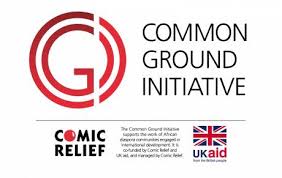 In addition, Comic Relief’s CGI programme could help to facilitate and enable Diaspora’s engagement and involvement in the initiative by funding some of the platform’s work in the UK and on the continent. This could contribute to increasing Africans Rising’s reach, supporter base and Diaspora participation in the UK and to enhancing the sustainable establishment of the ACSI platform on the continent. Africans Rising represents a Diaspora – Africa civil society network that will facilitate sharing of knowledge, best practice, the development of partnerships and a reservoir of resources that would effectively contribute to advancing Comic Relief’s two CGI key themes: Diaspora Finance & Investment and Women and Girls’ Rights both in the UK and the continent.
In addition, Comic Relief’s CGI programme could help to facilitate and enable Diaspora’s engagement and involvement in the initiative by funding some of the platform’s work in the UK and on the continent. This could contribute to increasing Africans Rising’s reach, supporter base and Diaspora participation in the UK and to enhancing the sustainable establishment of the ACSI platform on the continent. Africans Rising represents a Diaspora – Africa civil society network that will facilitate sharing of knowledge, best practice, the development of partnerships and a reservoir of resources that would effectively contribute to advancing Comic Relief’s two CGI key themes: Diaspora Finance & Investment and Women and Girls’ Rights both in the UK and the continent.
CONCLUSION
Following the intense two days of plenaries, discussions and debates, participants at #AfricanRising conference resolved to create a new civil society movement to tackle the critical issues facing the continent.
According to the Kilimanjaro Declaration that was adopted at the #AfricansRising Conference, participants resolved that their work should build a local, national, continental and global campaign that is:
- Expanding space for civic and political action
- Fighting for women’s rights and freedoms across society
- Focusing our struggles on the right to Equity and Dignity
- Demanding good governance as we fight corruption and impunity
- Demanding climate and environmental justice
The also conference declared that:
- Africa is a rich continent. That wealth belongs to all our People, not to a narrow political and economic elite. We need to fight for economic development that is just and embraces social inclusion and environmental care. We have a right to the ‘better life’ our governments have promised.
- Africans have a diverse, rich and powerful heritage that is important to heal ourselves and repair the damage done by neoliberalism to our humanity and environment. Being African, embracing the philosophy of Ubuntu should be a source of our pride.
- African Youth are a critical foundation of building the success in our continent and must play a central role in building Africans Rising.
- Africa’s Diaspora whether displaced through slavery and colonialism or part of modern day migration are part of Africa’s history and future. They are a reservoir of skills, resources and passion that must be harnessed and integrated into our movement.
- We are committed to a decentralised, citizen-owned future that will build support and solidarity for local struggles, empower local leadership and immerse our activists in grassroots work of building social movements from below and beyond borders.
- We are committed to building a citizens movement that is accountable to the constituencies we represent and enforcing the highest standards of ethical behaviour.
By the end of the Validation Conference on 25 August, the participants had established a way forward to build the Africa our people want and deserve through the new platform, that is, one based on peace, justice and inclusive sustainable development. The movement will work towards expanding the space for civic and political action; fight for women’s rights and freedoms; focus on the right to equity and dignity; demand good governance and work towards achieving more justice in addressing the effects of climate change. Launch Director, Kumi Naidoo, said it was hoped that the movement would be launched in every country to commemorate Africa Day on 25 May next year.
CALL ON OUR PEOPLE AND ACTIVISTS TO:
Join this Africans Rising Movement and mobilise our people around this shared vision; organise and connect local struggles under this umbrella; galvanise solidarity with all African struggles. This movement is committed to peace and non-violent action. We assert our inherent rights as Africans and invite our governments, leaders, other stakeholders and institutions to join us in pursuing the Future We Want to leave our future generations.
We commit to mobilising our people in Africa to launch this Movement on the 25th May, 2017, when we deepen the meaning of African Liberation Day and call on all sectors of our society to mobilise and organise events in every African country that will build the momentum towards the genuine liberation of our beautiful continent.

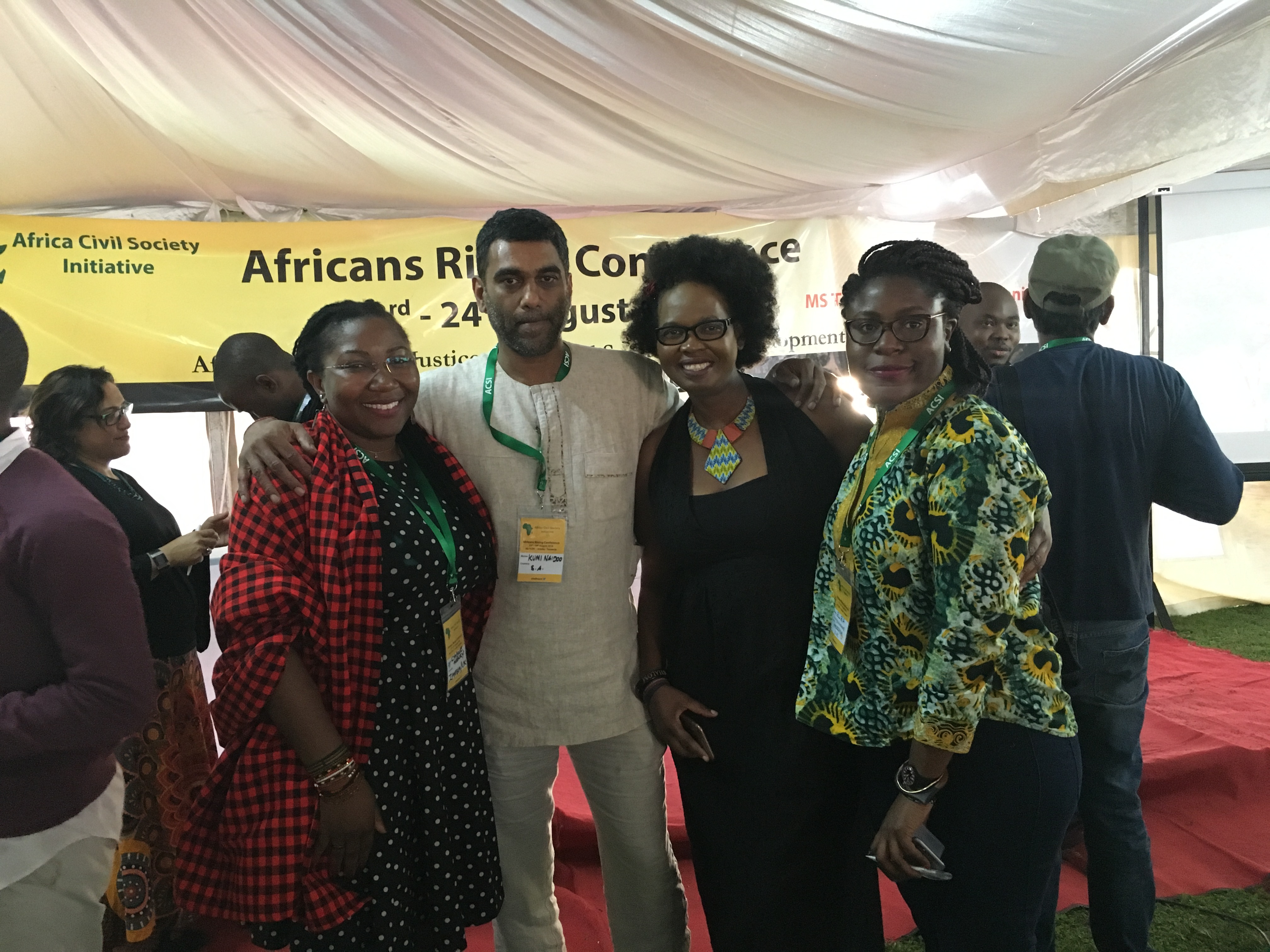
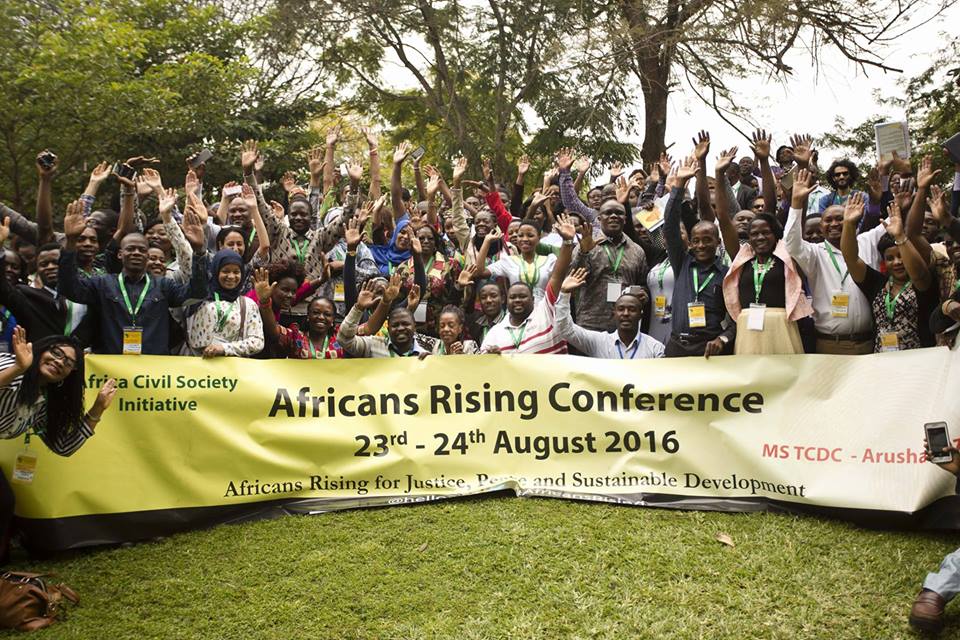
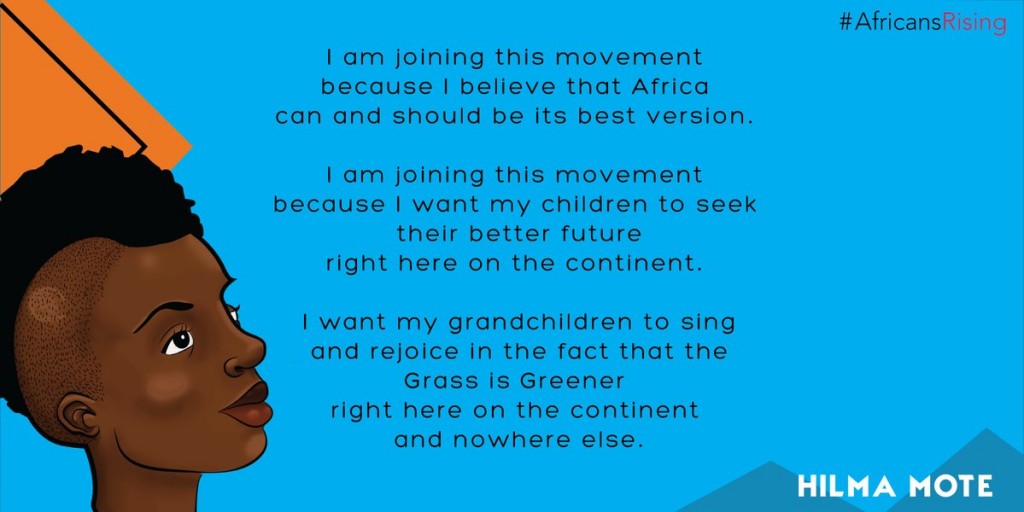
No Comments to "Diaspora Report: #AfricansRising Conference – Arusha, Tanzania"